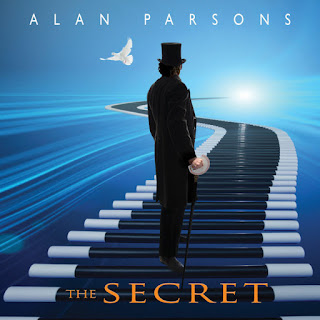Sunday, May 26, 2019
Alan Parsons - The Secret
It's difficult to think of a producer who has had a hand in as many memorable albums as Alan Parsons - from his work at Abbey Road Studios with The Beatles and Pink Floyd, his production roles with The Hollies, Al Stewart and others, as well as his own solo records and collaborative band with Eric Woolfson, The Alan Parsons Project. His imprint on an albums' sound is wonderfully consistent and instantly recognizable: softened drums, lush string arrangements, layered vocal harmonies, and an all-encompassing warmth that envelopes the listener like a favorite blanket.
Returning with his 5th solo album and his first in 15 years, The Secret, if nothing else, is a textbook Alan Parsons experience. Fans of his work in the 70s and 80s with his Project will find themselves right at home amidst the soft pop on offer here, which makes up the bulk of the material. As usual there is a light flourish of art rock adornment to be found - particularly on album highlight "One Note Symphony" and the opening track "The Sorcerer's Apprentice". The majority of the album rests squarely in the soft pop category of Parson's wheelhouse, and longtime Project listeners will no doubt find the driving guitar-lead chug of "Miracle" and "As Lights Fall" reminiscent of Eye in the Sky-era Parsons Project.
While the album as a whole sounds excellent, I find that some of the songwriting decisions don't quite work out. "As Lights Fall" features Alan Parsons tackling the lead vocal role himself quite capably, but on "One Note Symphony" his vocal harmonies are noticeably off-key. Another trademark element of Alan Parsons Project albums is the rotating cast of singers, a feature that has been carried along onto The Secret, and I have few complaints with the roster Alan has assembled here. Jared Mahone ("I Can't Get There from Here"), Todd Cooper ("One Note Symphony", "Requiem"), and Mark Mikel (The incredibly Lennon-esque "Fly to Me") are my personal standouts and all deliver their performances wonderfully. The sole stumbling blocks come in the form of the bizarre inclusion of Foreigner's Lou Gramm on the ballad "Sometimes", a song that manages to be excessively schmaltzy even for an Alan Parsons album. The more I hear the track the more I think that fellow Brit Elton John would have been much more suited to the melody and desired delivery style, as Gramm's warbly vibrato distracts me more than enchants me.
The last couple of songs are fine, but nothing incredible. Songwriting was never Alan Parson's talent in the past, and The Secret doesn't do much to change that perception - there are few surprises here in terms of arrangement and composition. What The Secret makes up for in raw pop writing, however, is pure production value and dynamic range - even the weaker tracks here resonate with Parson's enhancements. Take the gorgeously overblown saxophone and piano tracks anchoring Todd Cooper's vocals on "Requiem", the string orchestration providing accent to P.J. Olsson's suave vox, or Alan's airy vocal harmonies in "Soiree Fantastique" - each track has been meticulously engineered and recorded to provide the richest listening experience possible. And that listening experience is Alan Parson's true legacy, because whenever the songwriting takes a dip or the lyrics get chintzy, you can always rest assured that the bottom line standard of what an acceptable sounding song is, will never drop too far below "fine". Mostly hits, a couple of misses, but The Secret as a whole is such a production treat to savor that it never feels aggressively out of place or overstays its welcome, clocking in at a modest 48 minutes. If you're a fan of the Alan Parsons Project or just excellent sounding records, The Secret is definitely worth your time even if it stumbles a couple of times before reaching the finish line. After all, who doesn't?
Saturday, May 11, 2019
Dream Theater - Distance Over Time
I'm not sure if listening to too much Steven Wilson/Alan Parsons-engineered albums recently have made my ears into production snobs, but I cannot bear to listen to this album the whole way through. I can't tell you how many times I've thought to myself "You can do this, no problem, it's really not that bad", pressed play, and turned it off after 2-3 songs. I'm not sure how much blame rests with the music itself but in either case, this album was not engineered well.
And the songs themselves? Actually, I enjoy a couple of them. "Paralyzed", "S2N", and "Room 137" probably crush live, and when the band commits to the huge riffs that Petrucci throws out, it works pretty well. Other than that, nothing very memorable. John Myung's bass tone is loud and muddy, the drums are as cold and flat as cell wall, and James Labrie sounds... odd. Not bad necessarily, just that some of his vocal lines sound strange, like they weren't sure if some of these songs would work better as instrumentals or not, and threw together some quick vocal melodies just in case. "At Wit's End" is also pretty enjoyable, but again, the mix drowning you in guitar while also seemingly never getting louder or any softer for the whole runtime just makes everything blur together - no quiet time means that none of the big crescendo moments land as well as they should. So yeah, a couple of good moments (especially the outro of "S2N", holy shit that's good) amidst a sea of heavily compressed, semi-memorable Dream Theater material.
Subscribe to:
Comments (Atom)

